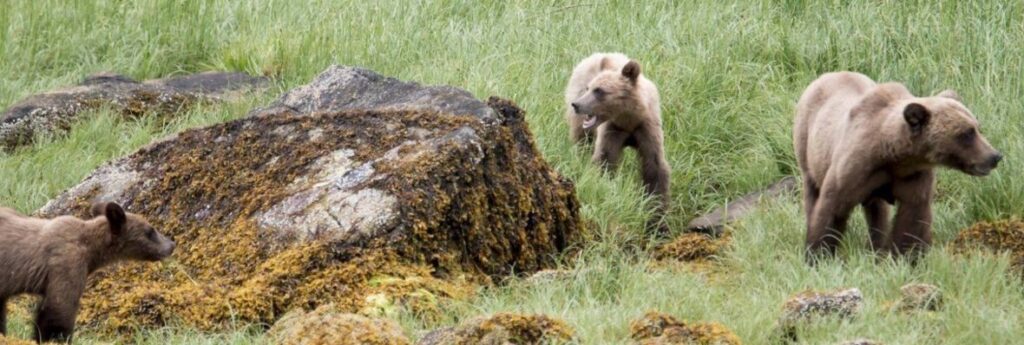Grizzly bears that visited ecotourism areas along a river on the province’s central coast were less likely than others to encounter conflict with people in communities downstream, a new study by British Columbia-based researchers has found. Jason Moody with the Nuxalk Nation’s fisheries and wildlife program said the research shows ecotourism done right is not a driving factor in conflict between bears and humans.
“The findings were pretty clear that if you’re viewing bears in the right way … (it) does not predispose them to bear-human conflicts later on,” said Moody, who contributed to the study and runs an ecotour operation based in Bella Coola.
Stories, songs and dances passed down through generations show the Nuxalk and other First Nations along B.C.’s coast have long coexisted with bears, he said. “It goes back centuries if not thousands of years, relationship with the bears, and we really identify with them in this part of the Great Bear Rainforest.”
But Moody said human activity, particularly in combination with poor salmon runs, has increasingly pushed grizzly bears into conflict with people.
The recent study in the Canadian Journal of Zoology emerged from the question of whether bears that visited ecotourism areas might be accustomed to people and predisposed to conflict, lead author Kate Field said. Some studies have linked tourist-related behavioural changes in wildlife, such as tolerance to humans, with increased “boldness,” she added.
But Field said the B.C.-based study reached a different conclusion in the context of ecotourism in the Bella Coola Valley.
It found grizzlies that visited ecotourism areas along the Atnarko River, which feeds into the Bella Coola River, were less likely than other bears to encounter conflict with people in communities about 40 to 60 km downstream, near the coast.
The study used hair sampling to identify 118 grizzlies along the river, with Field describing its banks as “DNA libraries” for cataloguing bear movement.
The researchers gathered samples during late summer and fall salmon runs from 2019 to 2021 and identified 34 bears that visited the ecotourism area at least once. They compared the samples against “conflict samples” from captured or euthanized bears collected by the B.C. Conservation Officer Service and found just one of those bears went on to have conflict with people in the Bella Coola Valley.
The other 29 bears that came into conflict with people were not detected at hair sampling sites in ecotourism areas along the Atnarko River, the study found.
“So, this pattern suggests that ecotour bears are not commonly encountering conflict, at least in this specific context,” Field said.
The study points to “other human-caused drivers of conflict” between people and bears, such as fruit trees and salmon-cleaning stations that attract hungry grizzlies.
Moody said the Nuxalk Nation works to reduce conflict through measures such as installing electric fencing around salmon-processing sites during harvest season.
Grizzlies go after garbage, compost and other food associated with humans when there’s not enough food available to them in the wild, Moody said.
“What we’ve been seeing is a trend, which (is) when you have good pink (salmon) runs, the conflict in the communities in this valley, throughout private properties as well, go down, just completely, almost completely disappear,” he said.
“The bears have no reason to take any risks and cross people’s yards or highways, the fish have filled up all the small creeks and the tributaries, and the bears are able to stay in some of the forest cover that’s still left for them without taking any risks.”
“If salmon aren’t available to bears, they might go searching for food elsewhere. So, it really underlies the importance of safeguarding salmon,” she said.
If this article was shared with you by a friend or colleague, you may enjoy receiving your own copy of Travel Industry Today with the latest travel news and reviews each weekday morning. It’s absolutely free – just CLICK HERE.

